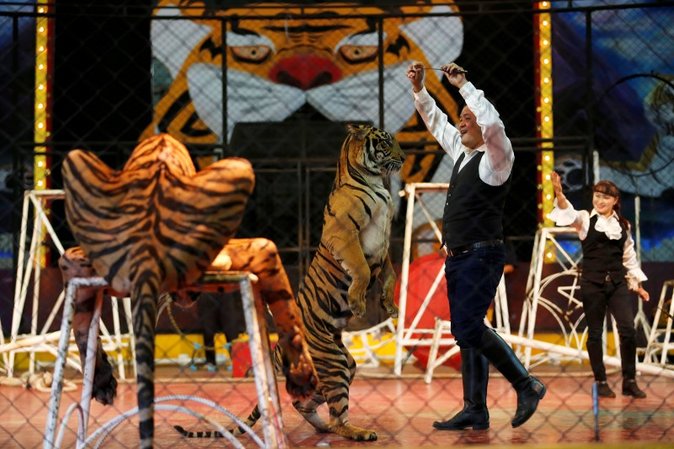From selfies with tigers to elephant rides and orangutan boxing, Thailand offers tourists an array of attractions that animal rights activists say are cruel and should be shut down.
Following the surprising findings at the scandal-ridden Tiger Temple last week, the Department of National Parks Wildlife and Plant Conservation (DNP) said it plans to inspect other tiger attractions as well.
On Wednesday, the department seized more than 100 animals, including two tigers and two elephants, from a zoo in the seaside town of Hua Hin.
It said it would also inspect the popular Sriracha Tiger Zoo in Chonburi, east of Bangkok, which came under scrutiny in 2004 after it shipped at least 100 tigers to a Chinese zoo.
“Sriracha was under the same kind of spotlight that the Tiger Temple is now, but it was never shut down and the tiger numbers are still high there,” said Steve Galster, executive director of Freeland, a Bangkok-based group fighting human and wildlife trafficking.
Like the Tiger Temple, Sriracha Tiger Zoo also charges tourists to feed or take selfies with cubs. Its main attraction is a circus in which seven tigers display what a ringmaster calls their “talents” — leaping through rings of fire and walking on their hind legs while the audience applauds.
The Sriracha Tiger Zoo’s management declined to comment.
Both the Tiger Temple and Sriracha Tiger Zoo are promoted on the website of the Tourism Authority of Thailand (TAT), a department of the Ministry of Tourism and Sports.
Tourism Minister Kobkarn Wattanavrangkul said that she had “no knowledge” of the trafficking allegations against the temple and said it was not her ministry’s responsibility to look into them.
“But if they’re true, of course, we will not condone it,” she said.
The TAT said that the information on its website was “outdated” and was being updated.
Wildlife officials discovered scores of dead tiger cubs while rescuing 137 tigers from a the Buddhist Tiger Temple last week. This raised fears that other tourist attractions could be fronts for animal trafficking and abuse as well.
The Tiger Temple was “just the tip of the iceberg,” said Jan Schmidt-Burbach, a Bangkok-based adviser at World Animal Protection.
“We see an increase in demand for wildlife entertainment, and there’s limited transparency on what goes on behind the scenes and how those venues are profiting from the animals.”
During their week-long raid on the Tiger Temple in Kanchanaburi, wildlife officials found frozen tiger carcasses, skins and dead cubs in jars. A possible contract the points to animal trafficking with a traders in Laos was also unearthed.
It is unclear why the Tiger Temple was storing dead tiger cubs and parts, although officials have said they might have been used for traditional Chinese medicine.
The authorities have filed complaints against 22 people, including six monks, whom police will investigate for illegal possession of wildlife and wildlife trafficking.
The temple’s abbot denied the allegations through his representatives at a press conference yesterday
Thailand has long been a hub for illicit trafficking of wildlife and forest products, and endangered animal species are often sold in its markets, fueled by the country’s animal tourism, according to Galster.
Story: Reuters




